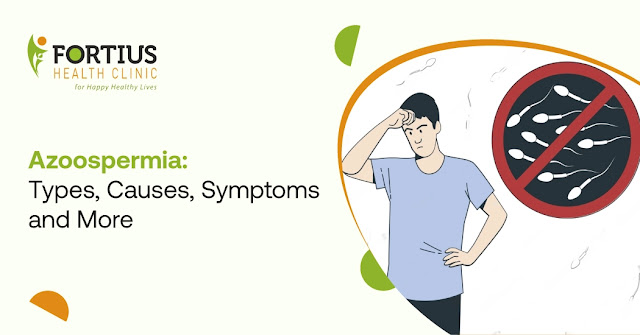Azoospermia : Zero sperm count in Semen - Fortius Health Clinic
Azoospermia, characterized by the absence of sperm in semen during ejaculation, presents a significant challenge to couples struggling with infertility. Accounting for 10-15% of male infertility cases, this condition can be classified into obstructive and non-obstructive types.
Obstructive azoospermia occurs when sperm production is normal, but blockages prevent sperm from mixing with semen. Causes include congenital absence of the vas deferens, previous surgeries, injuries, vasectomy, inflammation, and sexually transmitted infections.
On the other hand, non-obstructive azoospermia involves inadequate sperm production or its absence altogether. Factors contributing to this type include genetic conditions like Klinefelter syndrome, hormonal imbalances, heat exposure, alcohol or drug consumption, varicocele, testicular trauma, and certain medical treatments.
Diagnosing azoospermia involves various tests, including semen analysis, hormonal testing to assess testicular function, genetic testing for chromosomal abnormalities, and imaging studies such as MRI or ultrasound scans to evaluate reproductive anatomy.
Treatment options depend on the type of azoospermia. Surgical correction may be pursued for obstructive cases, involving procedures like vasectomy reversal or epididymal reconstruction. Hormonal therapy can address hormonal imbalances affecting sperm production. Assisted reproductive techniques (ART) such as microsurgical sperm retrieval (MESA) or testicular sperm extraction (TESE) combined with intracytoplasmic sperm injection (ICSI) or in vitro fertilization (IVF) offer options for non-obstructive azoospermia.
In addition to medical interventions, lifestyle modifications are crucial in managing azoospermia. Maintaining a healthy weight through balanced nutrition and regular exercise is vital, as obesity or being underweight can disrupt hormone levels. Avoiding excessive heat exposure, smoking, and heavy alcohol consumption can also improve sperm quality and overall fertility. Stress management techniques like yoga, meditation, or therapy can mitigate the negative impact of prolonged stress on reproductive health.
Despite the lack of overt symptoms, the emotional toll of azoospermia and infertility can be significant. Seeking support from healthcare professionals specializing in reproductive health can provide guidance and options for couples navigating this challenging journey.
In conclusion, azoospermia presents a multifaceted challenge for couples seeking to conceive. Understanding its types, causes, diagnosis, and treatment options is essential for informed decision-making and emotional well-being. With comprehensive medical care and lifestyle adjustments, couples affected by azoospermia can explore avenues to realize their dreams of parenthood.
FOR MORE INFO VISIT: https://www.fortiushealthclinic.com/blog/azoospermia-symptoms-types-and-treatments/




Comments
Post a Comment